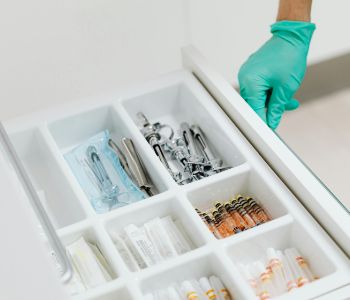This website uses cookies so that we can provide you with the best user experience possible. Cookie information is stored in your browser and performs functions such as recognising you when you return to our website and helping our team to understand which sections of the website you find most interesting and useful.

Sustainability In Dental And Medical Supplies
Posted on November 4, 2024
The healthcare industry, including dentistry, is steadily adopting sustainable practices as environmental awareness increases. Efforts to minimise single-use plastics and opt for biodegradable materials are gaining momentum, with eco-friendly dental supplies and sustainable approaches becoming key focus areas. This shift is part of a larger effort to reduce the ecological footprint of healthcare, particularly in dentistry, where disposable products are prevalent.
The Need for Sustainability in Dentistry
Healthcare facilities generate millions of tonnes of waste each year, much of which winds up in landfills or oceans. This includes single-use items like gloves, masks, syringes, and packaging materials.
Dentistry, in particular, faces challenges related to sustainability due to the extensive use of disposable products like plastic cups, bibs, and instrument packaging. While these items are essential for maintaining sterility and patient safety, they contribute significantly to environmental degradation.
The concept of “sustainable dentistry” has emerged in response, aiming to balance quality patient care with environmental responsibility. By transitioning to eco-friendly dental supplies, dental practices can help reduce their environmental impact and align with the growing demand for sustainable practices.
The Rise of Eco-Friendly Dental Supplies
The emergence of eco-friendly dental supplies marks a significant step towards sustainable dentistry.
Products such as biodegradable bamboo toothbrushes are becoming popular alternatives to traditional plastic ones, offering a way to reduce plastic waste.
Biodegradable dental floss made from natural materials like silk or cornstarch is another example, as it decomposes more naturally compared to nylon-based floss.
In addition to small consumables, larger dental equipment is being designed with sustainability in mind. Dental chairs, lights, and cabinets made from recycled metals, low-VOC paints, and energy-efficient designs are becoming more common.
These innovations reduce the environmental footprint of dental clinics while still providing high-quality patient care.
Sustainable Dentistry Beyond Supplies
Sustainable dentistry involves more than just switching to eco-friendly dental supplies. It requires a holistic approach that includes reducing energy consumption, optimising water use, minimising waste, and implementing recycling programmes.
Many dental clinics are adopting energy-efficient LED lighting, water-saving devices, and digital radiography, which reduces the need for chemical-based film processing.
One effective strategy is to reduce reliance on single-use plastics. Reusable or biodegradable alternatives, such as sterilisable stainless steel cups and washable patient bibs, can significantly cut down on plastic waste. Digital solutions like electronic health records and digital impressions further minimise paper usage and improve overall efficiency.
Benefits of Sustainable Practices
The benefits of adopting sustainable practices in dentistry are numerous. Environmentally friendly practices not only reduce the carbon footprint of dental clinics but also appeal to a growing number of eco-conscious patients. Clinics that use eco-friendly dental supplies and sustainable practices can enhance their reputation, attract more patients, and differentiate themselves from competitors.
Sustainability also offers cost savings over time. For instance, energy-efficient equipment and water-saving technologies can lower utility bills, while digital systems reduce administrative costs associated with paper-based record-keeping. Although some eco-friendly products may have a higher upfront cost, they are often more economical in the long run due to their durability and reusability.
Challenges and the Future of Sustainable Dentistry
While sustainable dentistry is gaining momentum, there are challenges to widespread adoption. The cost of eco-friendly dental supplies and equipment can be higher than conventional options, and some professionals may resist changing established practices. However, as technology advances and more companies produce sustainable products, prices are likely to decrease, making these options more accessible.
The future of sustainable dentistry looks promising as awareness grows and more dental professionals recognise the importance of environmentally responsible practices. Education and advocacy are key to overcoming resistance and encouraging the adoption of sustainable practices across the dental industry.
